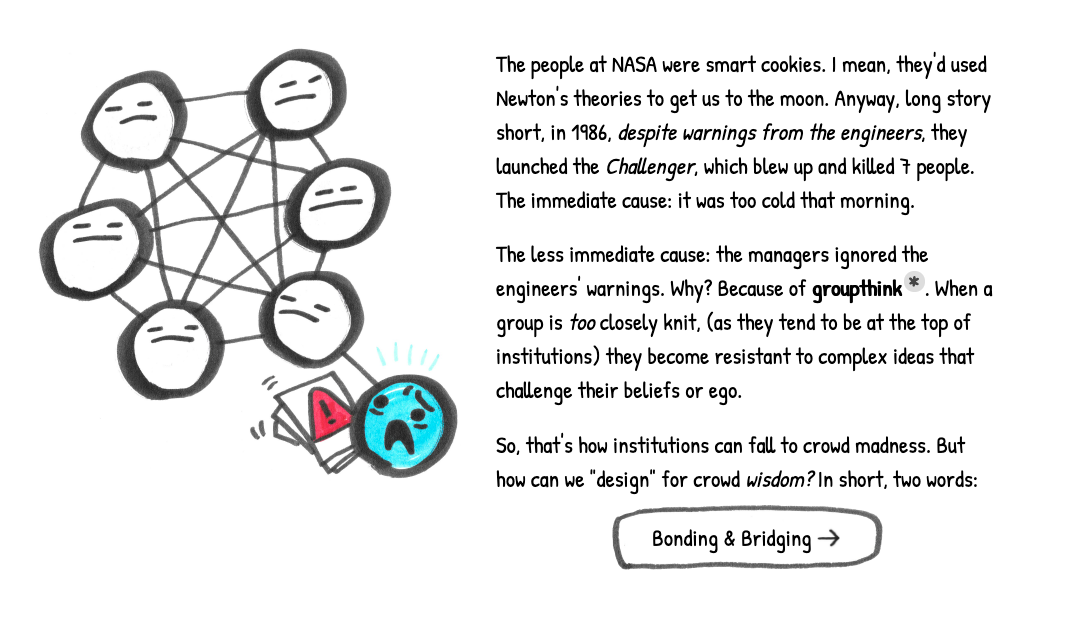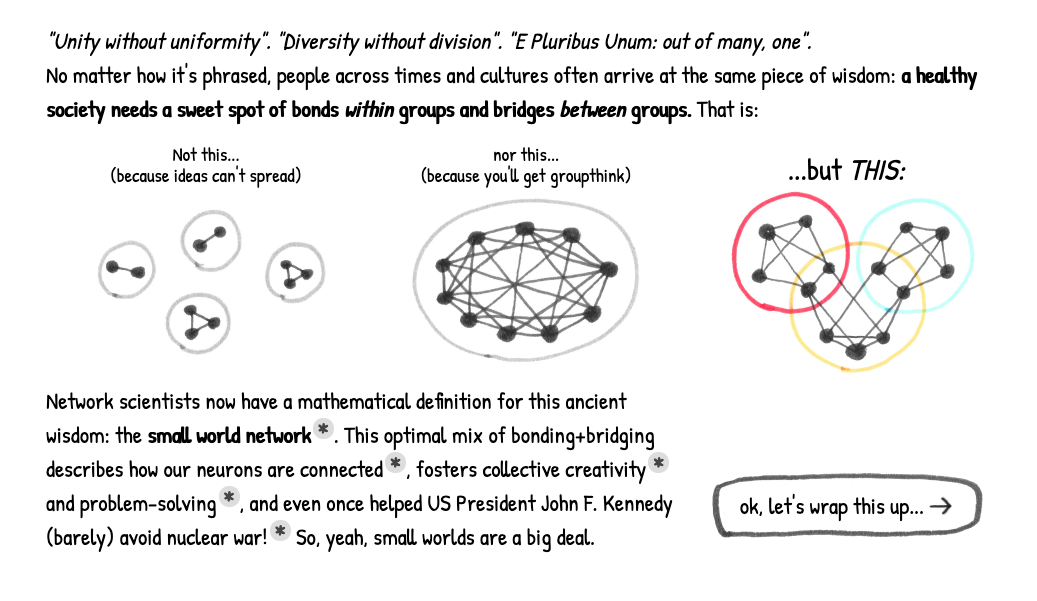Is truth discovered in social networks?
J. Hathaway
- 8 minutes read - 1534 wordsWe have coined the phrase ‘social networks’ as primarily a set of apps and websites connected to the internet. Our national and religious leaders use this phrase to imply how we talk to people through our phones. There was even a movie given that title to represent the rise of Facebook. However, social networks have been vital in humankind’s existence since the fall of Adam and Eve. As humans, we build truth beliefs based on the social connections that surround us1. God and Satan both know that social networks are how we find and learn the truth and use it to their advantage. I connect the latest in social network science with examples from our scriptural history and current environment to see that we build truth and lies on the same foundation.
Cain and Abel’s Social Networks
And Cain loved Satan more than God. And Satan commanded him, saying: Make an offering unto the Lord.2
A complication of truth and social networks is that relationships and social norms are entangled in the process. Our family gets a tremendous advantage in defining how we perceive the world and determine a giver of truth. However, God gives each child the gift of agency - the gift to choose who they will love. Regardless of our social networks, we can reach outside of them to our detriment or benefit. Cain decided to find a voice that would justify his perceptions. Satan was willing to give him another view to sustain him.
And it shall be said in time to come—That these abominations were had from Cain; for he rejected the greater counsel which was had from God; and this is a cursing which I will put upon thee, except thou repent. And Cain was wroth, and listened not any more to the voice of the Lord, neither to Abel, his brother, who walked in holiness before the Lord. And it came to pass that Cain took one of his brothers’ daughters to wife, and they loved Satan more than God.3
We need a social network to justify our beliefs. Cain did not leave his family in isolation. He found a strong voice and then joined forces to bring others into his network of perception. Our Decision to align with what a group believes is at the core of faith, family, and politics. All three of those are wrapped up in the story of Adam, Abel, and Cain.
And the children of men were numerous upon all the face of the land. And in those days Satan had great dominion among men, and raged in their hearts; and from thenceforth came wars and bloodshed; and a man’s hand was against his own brother, in administering death, because of secret works, seeking for power.4
How do we discern which network we are following?
The story above is dramatic in the murders and competing parties of God versus Satan. Many social networks are not as crucial to our eternal salvation. In these less dramatic social networks, we are pushed to decide if Donald Trump or the press provides the voice of reason, if vaccines work or are overblown, or if tomato hornworms are poisonous caterpillars. What makes different groups align with one side or the other of each of these ’truth statements?’
The Cailin O’ Conner published an article on this topic in the Scientific American that pushes on this topic. He says,
We develop most of our beliefs from the testimony of trusted others such as our teachers, parents and friends. This social transmission of knowledge is at the heart of culture and science. But our ability has a gaping vulnerability: sometimes the ideas we spread are wrong.5
The group is the blessing and the curse
But part of what makes propaganda and disinformation so effective in an age of social media is the fact that people who are exposed to it share it widely among friends and peers who trust them, with no intention of misleading anyone.5
We have a soft spot for loved ones in our social networks. It can leave us open to infection in the traditional sense of the flu and Covid-19 or to believe statements that may not have a strong foundation in truth. We have an obligation to love and support our family and friends, but that love does not require us to only listen to their views.
One of the elements that create competing social networks is the complication of scientific and religious truth’s entanglement with probability (see my Is faith probability? post).
Real scientific evidence is probabilistic, of course. For example, some nonsmokers get lung cancer, and some smokers do not get lung cancer. This means that some studies of smokers will find no connection to cancer. Relatedly, although there is no actual statistical link between vaccines and autism, some vaccinated children will be autistic. Thus, some parents observe their children developing symptoms of autism after receiving vaccinations. 5
This probabilistic outcome opens the door for strong voices in a social network to continue to justify their belief even if it may be wrong. The problem with social networks is when we decide that our network is the only purveyor of truth and that the other network deals in lies. These polarized networks then start to succumb to negative pressures regardless of the group’s truth status.
- Conformity:5 Holding conformity of thought as more important than diversity of thought will create long term problems.
- Selective Sharing:5 Hiding facts because they may confuse others or weaken an advocate’s argument.
- Defamation:6 Creating a focus on outside groups as inauthentic with name-calling or derogatory labeling.
The vital part of this entire process is that almost the whole network makes decisions in conformity with the group in good faith. Most of the network actors think they are making the ‘right’ or ’true’ choice. This interactive app on the wisdom and/or madness of crowds is worth the time to build a better understanding of groups and why we believe what we believe. They make a few significant points during the app training that I snipped for the conversation below.
But letting a ‘false truth’ into our community is terrible, isn’t it?
We have to find a way to allow the broad community to interact for complex truths to breed and spread without opening the door to lies to infect. This dilemma is at the heart of our struggle with COVID-19. It is just problematic enough to cause worry but not ‘bad’ enough to justify network isolation to the point that our supply chain collapses. Political and Religious truths may be very similar to COVID-19, there are concerns about interacting with people outside of our networks, but it doesn’t justify isolation. Like a pandemic, we can do things to provide some safety from the ‘spreaders’ of lies while allowing complex truths to grow. Doctrine and Covenants 88: 118-119 help us understand the balance between increasing complex truths through large interconnected networks while avoiding the spread of contagions.
And as all have not faith, seek ye diligently and teach one another words of wisdom; yea, seek ye out of the best books words of wisdom; seek learning, even by study and also by faith. Organize yourselves; prepare every needful thing; and establish a house, even a house of prayer, a house of fasting, a house of faith, a house of learning, a house of glory, a house of order, a house of God;
We must trust our protections of faith, prayer, order, and glory as we teach one another words of wisdom from the best books, websites, and groups. If we don’t trust our faith, prayer, order, and glory to allow us to find words of wisdom beyond our isolated networks, we will fall into an equally problematic disease of groupthink.
Conformity or Groupthink
Great groups built on quality science, a good business model, or a correct faith can suffer from groupthink. We should see this group think as wrong and find ways to allow complex truths that go against the prevailing culture to grow. The NASA story in the image below is a beautiful example. I believe that The Church of Jesus Christ of Latter-day Saint’s handling of blacks and the priesthood is another worthwhile example for conversation. Well-intentioned people can warp their understanding with a confirmation bias.

Unity without uniformity
We need a healthy bond between and within groups to build the proper space for complicated truth to flourish labeled as small world networks in science. Selective sharing and defamation create the two networks on the left. Healthy systems move beyond selective sharing and labeling to find unity in understanding. I believe that God’s truths thrive in the third network shown on the right. A network where members of different faiths, parties, or families interact to refine their thinking and understanding around truth.

-
This post finishes a set of three posts on truth and how we perceive it. They are the last three in the truth tags - Can we know anything? and Is faith knowledge of unlikely yet actual possible outcomes? Is faith probability? (Alma 32:21). ↩︎
-
How Misinformation Spreads—and Why We Trust It ↩︎ ↩︎ ↩︎ ↩︎ ↩︎
-
https://www.reuters.com/article/us-musk-lawsuit-landscape/musks-defamation-win-may-reset-legal-landscape-for-social-media-idUSKBN1YB023 and https://meshbesher.com/news-and-updates/legal-tips-basics/social-media-stander-and-defamation-do-you-have-a-case/ are two examples. ↩︎